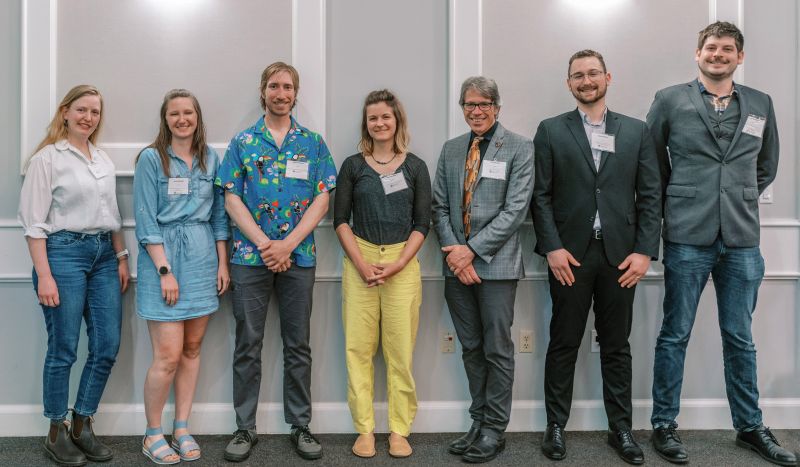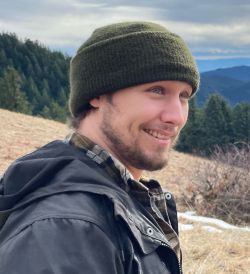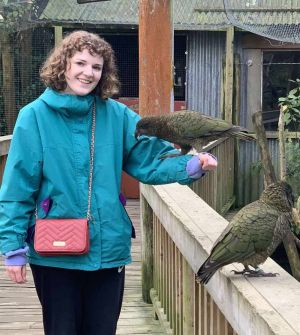
Jenna Deibel graduated from the College of Forestry in March 2023 with a Master of Natural Resources (MNR) with a focus in Policy. She also received her Bachelor of Science in Natural Resources with an option in Tourism, Recreation, and Adventure Leadership from the college in December 2021. She recently started her position as an Extension Forester in central Oregon.
Does one class, teacher or experience really stand out?
The class that stands out to me as a pivotal experience was Recreation Resource Management with Dr. Mark Needham, which I took Fall Term freshman year. While the course was totally fascinating to me as an ambitious wilderness ranger wannabe, what was truly life-changing was how Mark instantly recognized my passion for the field and agreed to advise my Honors thesis. He later recommended me to my then Department Head, Dr. Troy Hall, for a seasonal role as a field data technician on the Mt. Hood National Forest recording wilderness campsite inventories and visitor encounters.
Because Mark and Troy took a chance on an eager student, the Forest Service hired me back for several summers as a trail crew member and wilderness ranger. I then became the guinea pig for the MNR Accelerated Master’s Program, conducted the Baseline Wilderness Character Monitoring Assessment for the Ochoco National Forest, and ended up teaching Recreation Resource Management at the OSU Cascades campus when it was offered for the first time last term! Instructing that class was really a full-circle moment for me. Not only did I get to teach the same class that captured my attention seven years ago, but I got to supplement the material with my own lived experiences, which was so fun.
How did COF prepare you for your career?
CoF not only gave me job opportunities, but also provided a space on campus to foster the skills and knowledge I needed to succeed after graduating. First off, the natural resource education I received at CoF was phenomenal and gave me a strong foundation in ecosystem sciences. Additionally, I attribute the confidence I have presenting and connecting with stakeholders to my time as a Student Ambassador for CoF, where I was responsible for touring prospective students and working alongside Extension folks at events. In short, I wouldn’t be where I am today without CoF!
I’d also like to give a shout out to the Adventure Leadership Institute (ALI) on campus, which isn’t housed in CoF, but many CoF students work for and take classes with the ALI. A CoF graduate is even their Trips Coordinator! While there, I received my Wilderness First Responder certification, took many awesome classes, and was a trip leader for a short time. Being a part of the ALI gave me tangible skills that directly supported my career and experience leading and teaching in the woods.
What are your main duties as an Extension Forester?
I think the answer to that question will largely be determined by what I learn about the central Oregon community’s needs during the following months! Generally, I am a non-formal educational resource for the public on forestry and natural resources topics in the region. Topics I could be contacted about might include how to improve the resiliency of a timber stand to mountain pine beetle, or assistance with Forest Protection Act policy interpretation, or even helping form connections with landowners and their local ODFW wildlife biologist, and everything in between! Once I have some time to formally assess the forestry-related needs of the community and how to properly respond, I will be able to start offering workshops and resources to help address those needs, whatever they may be.
And you know I have to ask this, what is your favorite tree?
Well, I’m originally from the Bay Area, so growing up it was the California black oak. I have many fond memories spending entire afternoons exploring their branches and observing the small micro-ecosystems that reside in their nooks and crannies. Since moving to central Oregon, however, I’ve quickly fallen in love with the quaking aspen. Just like I used to spend hours with the oaks, now I can lay in the grass and watch the aspen leaves quake until the sun sets!
Anything else you would like to share?
I would just like to express how honored I am to serve as central Oregon’s next Extension Forester. I worked with one of my predecessors, Dr. Stephen Fitzgerald, during my time as a CoF ambassador, and I saw just how powerful effective scientific communication could be. I’m fortunate to be surrounded by colleagues who are not only brilliant but are able to communicate their wealth of knowledge in an accessible way so everyone can benefit from it. I’m excited to learn from and work alongside them, and I’m so grateful for the support I’ve already received since starting last week!












